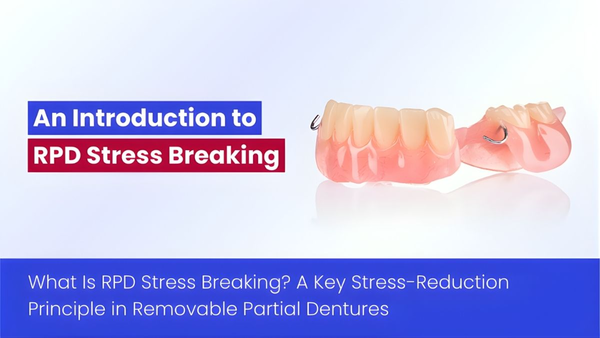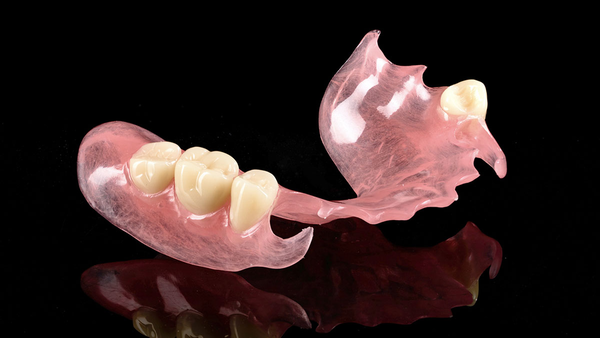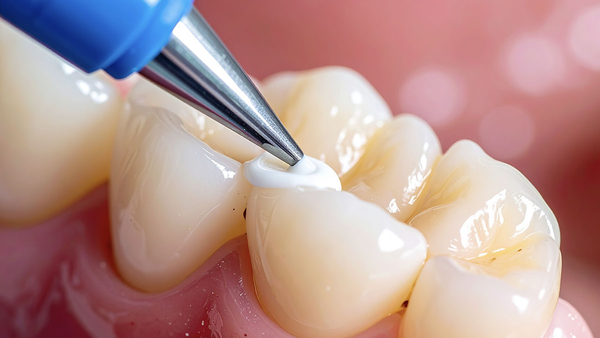Framework materials are the backbone of modern dental restorations, playing a crucial role in ensuring the strength, durability, aesthetics, and biocompatibility of dental prosthetics. With advancements in technology, the choice of framework materials has expanded significantly, allowing dental professionals to tailor solutions to meet specific clinical and patient needs.
Table of contents [Show]
Framework materials are the backbone of modern dental restorations, playing a crucial role in ensuring the strength, durability, aesthetics, and biocompatibility of dental prosthetics. With advancements in technology, the choice of framework materials has expanded significantly, allowing dental professionals to tailor solutions to meet specific clinical and patient needs. This article provides a detailed overview of the types of framework materials, their properties, clinical applications, manufacturing methods, and future trends shaping the dental industry.
Types of Framework Materials
Framework materials in dentistry can be broadly categorized into metal-based, ceramic-based, and polymer-based options. Each material class offers unique advantages and limitations, making them suitable for different clinical scenarios.
Cobalt-Chromium (Co-Cr)
Popularity: Co-Cr is the most commonly used base metal alloy for dental frameworks.
Mechanical Properties: Known for its high elastic modulus and strength, Co-Cr offers excellent durability for partial dentures and implant frameworks.
Cost-Effectiveness: A budget-friendly alternative to precious metal alloys.
Fabrication Methods: Can be processed through casting, CAD-CAM milling, or selective laser melting techniques.
Titanium (Ti)
Biocompatibility: Titanium is considered the gold standard for implant frameworks due to its exceptional tissue compatibility.
Lightweight: Titanium is corrosion-resistant and lightweight, making it ideal for long-term use.
Stress Distribution: Its lower elastic modulus provides better stress distribution compared to Co-Cr.
Challenges: Casting titanium can be difficult, but it excels in CAD-CAM milling workflows.
Superior Biocompatibility: Gold-based and platinum-based alloys offer unmatched tissue compatibility.
Casting Properties: Excellent marginal adaptation due to their casting characteristics.
Cost Limitation: Higher expenses restrict their widespread use in modern dentistry.
Ceramic Frameworks
Glass-Ceramics
Glass-ceramics are renowned for their superior aesthetics and translucency, making them ideal for anterior restorations.
Key Types:
Lithium Disilicate (e.max)
- Fabricated using CAD/CAM or ceramic-press methods.
- Offers high strength and translucency for crowns, veneers, and bridges.
Leucite-Reinforced Ceramics
- Primarily used for veneers and anterior crowns due to their aesthetic properties.
Zirconia-Reinforced Lithium Silicate
- Combines the strength of zirconia with the aesthetics of glass-ceramics.
Polycrystalline Ceramics
Polycrystalline ceramics are high-strength materials designed for load-bearing restorations, particularly in posterior teeth.
Key Types:
Zirconia (Y-TZP)
- Exceptional strength and biocompatibility.
- Ideal for posterior crowns, bridges, and implant-supported restorations.
Alumina
- Used for anterior crowns and veneers due to its natural luster and color.
Zirconia-Toughened Alumina (ZTA)
- New formulations with alumina/zirconia ratios (e.g., 80/20, 70/30) offer enhanced flexural strength.
Polymer-Based Frameworks
PEEK (Polyetheretherketone)
Performance: PEEK is a high-performance thermoplastic polymer with a bone-like elastic modulus, providing excellent shock absorption.
Manufacturing Options: Can be milled or pressed, offering flexibility in fabrication.
Wear Resistance: Demonstrates significantly less wear compared to PMMA and composite materials.
Fiber-Reinforced Composites
Strength Enhancement: Glass or carbon fiber reinforcement improves strength while maintaining lightweight properties.
Aesthetic Potential: Fiber-reinforced composites can be customized for individual patient needs, offering translucency and natural appearance.
Properties Comparison
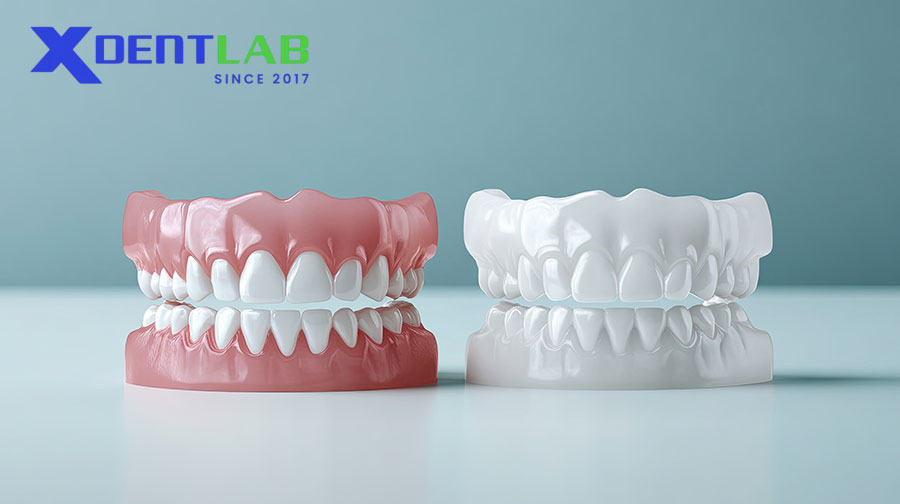
Mechanical Properties
Strength and Durability
Metal Frameworks: Co-Cr and titanium provide the highest strength and longevity, making them ideal for long-term restorations.
Ceramic Frameworks: Zirconia offers ceramic strength comparable to metals, suitable for demanding applications.
Polymer Frameworks: PEEK provides lower strength but better stress distribution due to its elastic modulus.
Fit and Precision
Digital Manufacturing: CAD-CAM fabricated frameworks consistently outperform traditional cast frameworks in terms of passive fit.
Material-Specific Fit: Titanium frameworks demonstrate better vertical fit compared to Co-Cr, while zirconia excels in marginal accuracy.
Biological Properties
Biocompatibility Rankings
Titanium: Gold standard for tissue compatibility.
Zirconia: Excellent tissue response and plaque resistance.
PEEK: Good biocompatibility with minimal plaque accumulation.
Precious Metals: Historically excellent but cost-prohibitive.
Co-Cr: Acceptable biocompatibility but potential for metal ion release.
Aesthetic Considerations
Zirconia: Best aesthetic outcomes for visible areas due to translucency and color stability.
PEEK: Can be veneered with composite for a natural appearance.
Metal Frameworks: Require opaque layers to mask the gray color.
Fiber-Reinforced Composites: Provide good translucency and aesthetic customization.
Clinical Applications
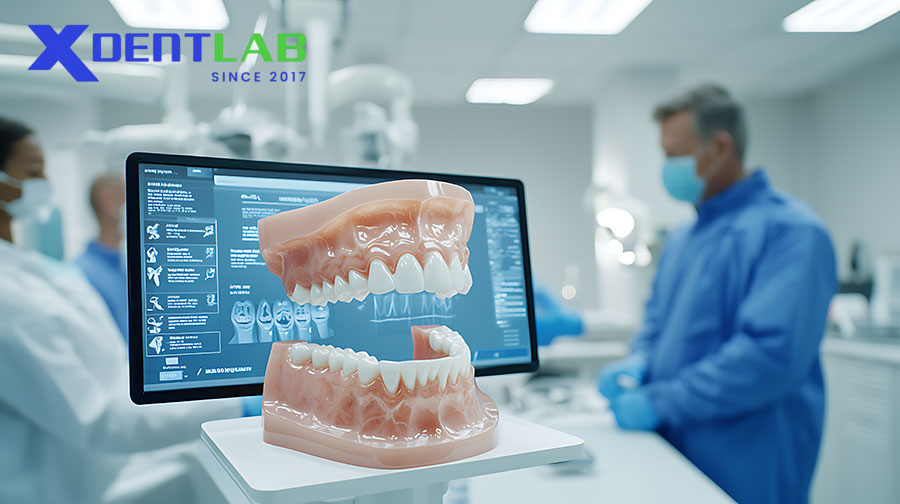
Full-Arch Implant Restorations
All-On-4 Frameworks
Zirconia: Preferred for aesthetic zones due to its natural appearance.
Titanium: Commonly used for posterior segments due to strength and biocompatibility.
Hybrid Designs: Combining metal substructures with aesthetic veneers for optimal results.
PEEK: Emerging as an alternative for patients with bruxism due to its shock absorption properties.
Partial Frameworks
Removable Partial Dentures
Co-Cr: Dominates the market due to its cost-effectiveness and strength.
PEEK: Gaining popularity as a metal-free option for patients with allergies.
Titanium: Used for metal-sensitive patients requiring durable frameworks.
Fixed Partial Dentures
Zirconia: Preferred for anterior bridges due to aesthetics.
Metal-Ceramic: Still widely used for posterior regions requiring strength.
CAD-CAM Polymers: Ideal for provisional frameworks in complex cases.
Manufacturing Methods
Traditional Techniques
Lost-Wax Casting: Common for metal alloys.
Pressing: Used for certain polymers.
Manual Layering: Applied for aesthetic veneers.
Digital Manufacturing
CAD-CAM Milling: Suitable for all material types, offering precision and efficiency.
3D Printing: Emerging as a viable method for metals and polymers.
Selective Laser Melting: Ideal for complex metal frameworks.
Digital workflows are rapidly becoming the standard, delivering superior accuracy, efficiency, and scalability.
Future Trends
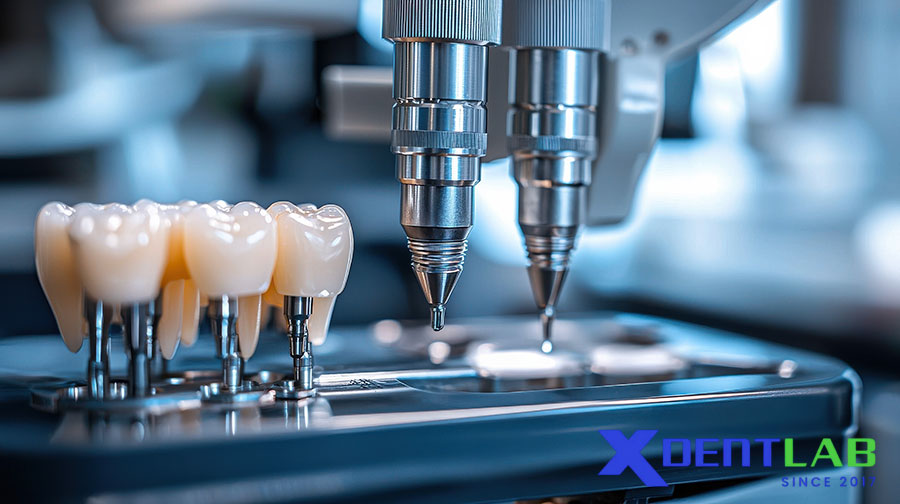
Emerging Materials
High-Performance Polymers: Enhanced mechanical and aesthetic properties.
Hybrid Materials: Combining strengths of different material classes.
Nano-Reinforced Composites: Improved strength and durability.
Smart Materials: Antimicrobial properties and self-healing capabilities.
Technology Integration
AI-Assisted Design: Optimizing framework designs for individual patients.
Real-Time Monitoring: Tracking framework performance over time.
Patient-Specific Selection: Algorithms for personalized material choices.
Improved Bonding Protocols: Enhancing multi-material frameworks.
XDENT LAB: Your Trusted Partner for Framework Solutions
At XDENT LAB, we specialize in providing high-quality framework materials tailored to meet the diverse needs of dental practices. With FDA and ISO certifications, state-of-the-art technology, and a team of over 100 certified technicians, we deliver reliable solutions that enhance clinical outcomes.
Why Choose XDENT LAB?
Lab-to-Lab Expertise: Comprehensive outsourcing services from Vietnam.
Digital Excellence: Advanced CAD-CAM workflows for precision frameworks.
Customized Options: From metal to polymer frameworks, we cater to your specific needs.
Conclusion
The selection of framework materials in dentistry depends on clinical requirements, patient factors, aesthetic demands, and cost considerations. Metal, ceramic, and polymer-based frameworks each offer unique advantages, with digital manufacturing increasingly influencing material choice and outcomes.
Partner with XDENT LAB to access cutting-edge framework solutions that combine innovation, quality, and efficiency. Let us help you redefine excellence in dental restorations.
XDENT LAB is an expert in Lab-to-Lab Full Service from Vietnam, with the signature services of Removable & Implant, meeting U.S. market standards – approved by FDA & ISO. Founded in 2017, XDENT LAB has grown from local root to global reach, scaling with 2 factories and over 100 employees.. Our state-of-the-art technology, certified technicians, and commitment to compliance make us the trusted choice for dental practices looking to ensure quality and consistency in their products.
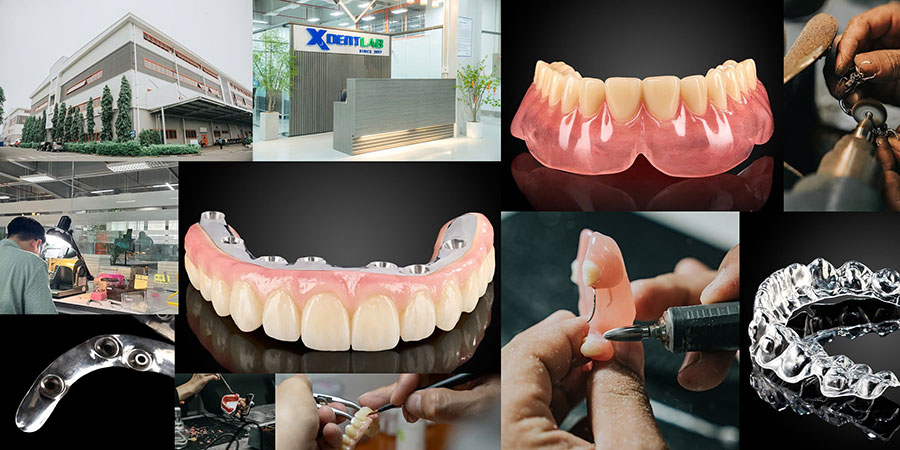
Our commitments are:
100% FDA-Approved Materials.
Large-Scale Manufacturing, high volume, remake rate < 1%.
2~3 days in lab (*digital file).
Your cost savings 30%.
Uninterrupted Manufacturing 365 days a year.
Contact us today to establish a strategy to reduce operating costs.
--------❃--------
Vietnam Dental Laboratory - XDENT LAB
🏢 Factory 1: 95/6 Tran Van Kieu Street, Binh Phu Ward, Ho Chi Minh City, Vietnam
🏢 Factory 2: Kizuna 3 Industrial Park, Can Giuoc Commune, Tay Ninh Province, Vietnam
☎ Hotline: 0919 796 718 📰 Get detailed pricing
Tags:
Framework materialsShare this post:

